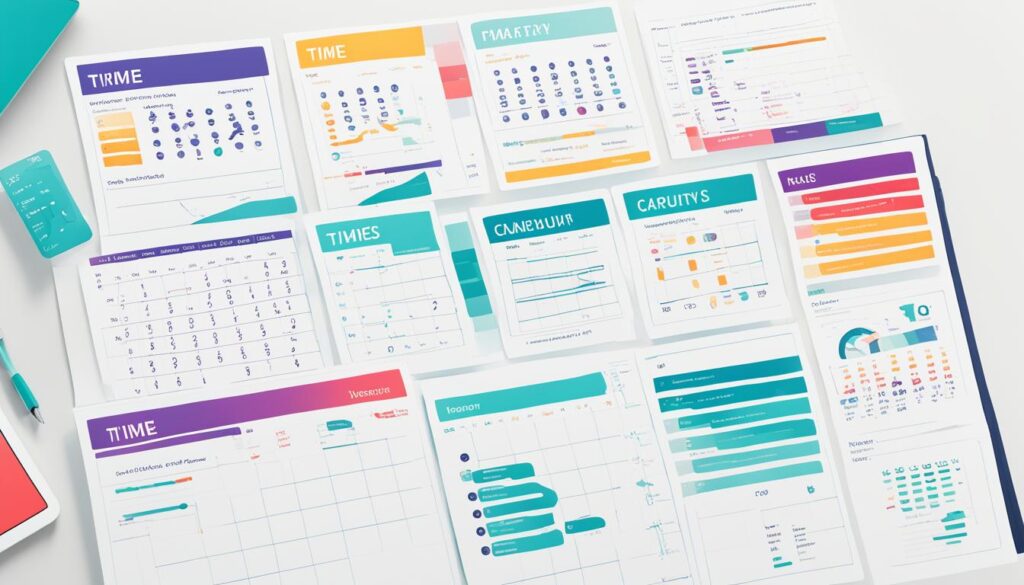Conquer Pressure with Effective Time Management

Are you constantly drowning in a sea of tasks, feeling overwhelmed and stressed? Do you find yourself running out of time and struggling to meet deadlines? It’s time to challenge the belief that working harder and faster is the solution. The key to conquering pressure lies in effective time management strategies that go beyond simply being efficient.
- Effective time management is crucial for managing pressure and stress
- Conventional time management techniques may not address the root causes of busyness
- Reducing the number of tasks, setting boundaries, and creating uninterrupted work time are essential principles for effective time management
- By implementing time management strategies, you can regain control of your schedule and reduce stress levels
- Remember, managing your time effectively requires continuous practice and adaptation
Takeaways>
Understanding the Negative Impact of Poor Time Management
Poor time management can wreak havoc on your productivity and mental well-being. When you struggle to effectively manage your time, the consequences can be far-reaching. You may find yourself overwhelmed with an ever-growing to-do list, constant distractions, and a mounting sense of pressure. This can lead to increased stress levels, reduced focus, and decreased efficiency in completing tasks. It may feel like you’re always playing catch-up, never truly in control of your time.
But fear not, there are ways to turn this around. By developing effective time management skills, you can regain control over your schedule, improve your productivity, and create a healthier work-life balance. Let’s explore some strategies that can help you better manage your time and alleviate the negative impacts of poor time management:
- Prioritize Tasks: Begin by identifying your most important and urgent tasks. Prioritize them based on deadlines and their impact on your goals. This will help you focus on what truly matters and avoid wasting time on trivial activities.
- Eliminate Time-wasting Activities: Identify activities that consume valuable time without contributing to your goals or well-being. This may include excessive social media usage, unnecessary meetings, or procrastination. Minimize or eliminate these distractions to optimize your time.
- Utilize Time Management Tools: Take advantage of technology and time management tools to streamline your workflow. Calendar apps, task management apps, and project management platforms can help you stay organized, track progress, and allocate time effectively.
By incorporating these strategies into your daily routine, you can develop strong time management skills, improve your productivity, and reduce stress levels. Remember, effective time management is a continuous practice that requires commitment and discipline. Stay focused, be intentional with your time, and embrace the benefits of effectively managing your time.
Now that we’ve explored the negative impact of poor time management, let’s move on to discovering key strategies for effective time management in Section 3.
The Impact of Poor Time Management
| Consequences of Poor Time Management | Benefits of Effective Time Management |
|---|---|
| Increased stress levels | Reduced stress and sense of control |
| Decreased focus and efficiency | Improved focus and productivity |
| Constantly playing catch-up | Proactive task completion and peace of mind |

Key Strategies for Effective Time Management
Implementing effective time management strategies is essential for dealing with pressure and increasing productivity. By adopting the following strategies, you can take control of your time and optimize your daily tasks.
Prioritize Tasks
To effectively manage your time, it’s crucial to prioritize your tasks. Determine which tasks are urgent and important, and prioritize them accordingly. This way, you can focus on completing the most critical tasks first and avoid wasting time on less important activities.
Create a Schedule
Developing a schedule can help you stay organized and maximize your productivity. Use a daily or weekly planner to allocate specific time slots for different tasks and activities. By sticking to a schedule, you can ensure that you have dedicated time for each task and avoid wasting time on unnecessary distractions.
Break Tasks into Manageable Chunks
Large tasks can often feel overwhelming, making it difficult to start or complete them. Break down complex tasks into smaller, more manageable chunks. This not only makes the task more approachable but also allows you to track your progress and stay motivated.
Utilize Time Blocking
Time blocking involves setting aside dedicated blocks of time for specific tasks or categories of work. For example, you can allocate a block of time in the morning for focused work, another block for meetings and collaborations, and a separate block for email and administrative tasks. By organizing your time in this way, you can ensure that each type of work receives sufficient attention and reduces multitasking.

Learn to Delegate
One key aspect of effective time management is recognizing when to delegate tasks. Delegation allows you to distribute workload and free up time for more pressing matters. Assess your tasks and identify those that can be assigned to others without compromising quality. Delegating not only relieves your workload but also develops the skills of your team members.
Practice Time Chunking
Time chunking involves grouping similar tasks together and allocating specific time blocks for them. For example, you can dedicate a block of time in the morning for replying to emails, another block for brainstorming and idea generation, and a separate block for meetings and collaborations. This method helps minimize context-switching and improves focus and efficiency.
Eliminate Time-Wasting Activities
Identify activities that consume a significant amount of your time without adding much value, such as excessive social media scrolling or unnecessary meetings. Find ways to eliminate or minimize these activities to free up more time for meaningful work. Set boundaries and be mindful of how you allocate your time and energy.
Set Realistic Goals
When planning your tasks and projects, set realistic goals that are within your capabilities and resources. Unrealistic goals can lead to unnecessary stress and overburdening yourself. Break big goals into smaller milestones and celebrate your achievements along the way. This approach will keep you motivated and on track.
Take Breaks and Practice Self-Care
Remember to schedule regular breaks throughout your day to rest and rejuvenate. Taking breaks can improve focus and prevent burnout. Additionally, practicing self-care activities such as exercise, meditation, or hobbies can help reduce stress and improve your overall well-being, leading to better time management.
By implementing these key strategies, you can manage your time more effectively, prioritize tasks, and reduce stress. Proactively managing your time is essential for success not only in your professional life but also in maintaining a healthy work-life balance.
The Importance of Self-Care in Time Management
When it comes to effective time management, it’s easy to get caught up in the never-ending cycle of tasks and responsibilities. However, in the midst of your busy schedule, it’s essential to prioritize self-care. Taking care of your physical and mental well-being is not a luxury; it’s a necessity for managing stress and maintaining productivity.
Self-care practices can help recharge your energy and improve your overall well-being, enabling you to approach your tasks with a renewed sense of focus and clarity. By incorporating self-care into your time management routine, you can enhance your ability to handle stress and maximize your productivity.
The Role of Stress Management
Stress management is a vital component of effective time management. When you neglect your well-being, stress levels can skyrocket, impacting your ability to focus, make decisions, and meet deadlines. Incorporating stress management techniques into your routine allows you to maintain a healthy work-life balance and prevent burnout.
Some stress management techniques include:
- Practicing mindfulness and meditation to calm your mind
- Engaging in physical activities to release tension
- Taking regular breaks to recharge and relax
- Establishing healthy boundaries to avoid overextending yourself
Productivity Tips for Self-Care
Self-care doesn’t mean sacrificing productivity. In fact, taking care of yourself can enhance your ability to accomplish tasks efficiently. Here are some productivity tips that incorporate elements of self-care:
- Start your day with a self-care routine, such as exercise or meditation, to set a positive tone.
- Take regular breaks throughout the day to rest and rejuvenate.
- Delegate tasks when possible to reduce your workload and alleviate stress.
- Set realistic goals and prioritize tasks based on their importance and deadlines.
- Practice effective time blocking techniques to ensure dedicated time for self-care.
- Create a peaceful and organized work environment that promotes relaxation and focus.
Incorporating self-care into your time management routine is essential for maintaining balance, managing stress, and maximizing your productivity. Remember, taking care of yourself is not selfish—it’s an investment in your overall well-being and success.

Conclusion
Effective time management is the key to conquering pressure and achieving a greater sense of calm and productivity in your life. By implementing proven time management strategies, prioritizing self-care, and taking a proactive approach to managing your tasks and responsibilities, you can regain control over your schedule and reduce stress levels.
Remember, effective time management is not a one-time solution. It is an ongoing skill that requires continuous practice and adaptation. By embracing the power of effective time management, you can unlock the potential for a more balanced and fulfilling life.
Take the first step today. Begin by analyzing your current time management habits and identifying areas for improvement. Experiment with prioritization methods, such as creating to-do lists and using time blocking techniques. Explore stress management techniques, such as meditation or exercise, to enhance your productivity and well-being.
Don’t underestimate the impact that effective time management can have on your personal and professional life. Start implementing these tips and strategies right away, and watch as you regain control, reduce stress, and achieve greater success and fulfillment.
FAQ
What is effective time management?
Effective time management refers to the ability to utilize your time efficiently and productively, enabling you to accomplish tasks, meet deadlines, and achieve your goals.
How can effective time management help with dealing with pressure?
By effectively managing your time, you can reduce feelings of overwhelm and pressure. It allows you to prioritize tasks, create a clear structure for your work, and set realistic goals, leading to increased productivity and a greater sense of control.
What are some common time management strategies?
Some common time management strategies include prioritizing tasks, breaking down projects into smaller steps, scheduling breaks, delegating tasks, and utilizing time management tools such as to-do lists and calendars.
How does poor time management impact productivity and stress levels?
Poor time management can lead to decreased productivity, increased stress levels, and a feeling of constantly playing catch-up. It can result in missed deadlines, a lack of focus, and an overwhelming workload.
Why is self-care important in time management?
Self-care plays a crucial role in effective time management. Taking care of your physical and mental well-being allows you to work more efficiently, alleviate stress, maintain focus, and prevent burnout. It includes practices such as getting enough sleep, engaging in regular exercise, and practicing mindfulness.






